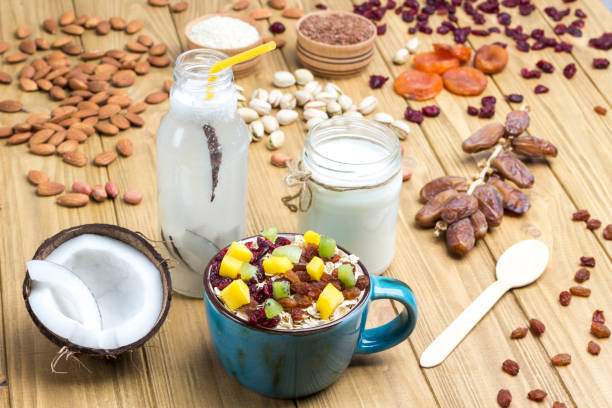Eating less processed foods is one of the best things you can do for your health and wellbeing. This includes reducing the amount of sugar you consume, cutting out dairy, and eating more plant-based foods.
It’s important to know that it takes a lot of time, effort, and discipline to eat healthier. It’s not just a diet or a temporary diet, but rather a lifestyle change that will always benefit you in the long run.
The benefits of eating less processed foods are not just for your health, but also for the environment. By avoiding processed foods and sticking to whole, natural ingredients, you can significantly reduce your carbon footprint.
In recent years, people have been trying to eat more healthy and less processed food in order to lose weight. However, it is not always easy to make the right choices. Here are five tips that can help you stick with your diet plan. Don’t be afraid of going out for a meal or socializing with friends while on your diet plan. Just make sure that you order something that is healthy and considers ordering an appetizer or dessert rather than a full meal. Keep track of what you eat by writing down what you eat in a journal or using an app like MyFitnessPal to track calories and macros. Limit your alcohol intake, especially if you’re trying to lose weight because alcohol can be high in calories and carbs which can lead to weight gain. Limit your snacking, even if you’re not hungry.
By limiting your snacking, you’ll be able to eat less and still feel full.- Exercise daily by focusing on the things you can do in your day-to-day life that don’t require a gym membership like walking or going for a bike ride.
The Ultimate List of 10 Ways to Eat Less Processed Food:
Page Contents
1. Buy fresh produce instead of frozen or canned vegetables
Frozen vegetables are not only packed with preservatives, but they also taste and smell different than fresh vegetables. The benefits of buying fresh produce instead of canned or frozen vegetables include better nutrition, lower cost, and less waste.
2. Buy fresh fruit instead of canned or frozen fruit
Fresh fruit is less processed and has higher nutritional value. It also tastes better and can be eaten raw.
Canned or frozen fruits are high in sugar, sodium, and preservatives. They also don’t last as long as fresh fruits, which means that you end up throwing away more food in the trash.
Buying fresh fruit instead of canned or frozen fruit is a simple way to reduce your carbon footprint.
3. Choose whole grains over refined grains
Whole grains are a great source of fiber, vitamins, minerals, and antioxidants. They also provide a lower glycemic index than refined grains. Refined grains are processed to remove the bran and germ from the grain. They are then made into white flour that has been bleached and enriched with vitamins and minerals. However, they offer no nutritional value over whole grains.
The benefits of using whole grains instead of refined ones include:
- Lower glycemic index
- Higher levels of nutrients
- Increased satiety
- Better digestion
- Improved mental health
- Eat whole-grain foods such as brown rice, oatmeal, quinoa, and whole-wheat bread.
4. Eat more legumes and use them in place of meat products
Legumes are a great source of protein and fiber. They also have a lower impact on the environment compared to meat.
It is important to eat legumes in place of meat because they have more nutrients and less environmental impact. In addition, they are more affordable than meat products.
Legumes are a good alternative to meat because they provide better nutrition, have a less environmental impact, and are more affordable than meat products.
5. Choose organic when possible
Organic is a term that has been used in the food industry for a long time. It means to grow crops without pesticides, herbicides, or chemical fertilizers. Organic farming is one of the most sustainable ways of farming and it works better for the environment than conventional farming.
The term “organic” has been used in many other industries as well – like the beauty industry and fashion industry. In these industries, organic means using natural ingredients like plants, flowers, herbs, and minerals rather than synthetic chemicals which are often harmful to our health and the environment.
Organic products are much healthier for you because they don’t contain any harmful substances like artificial colors or preservatives.
6. Cook at home whenever possible and avoid fast food restaurants as much as possible
Fast food restaurants are not a healthy option for any reason. They are loaded with unhealthy ingredients and preservatives. The long list of ingredients in the foods they offer can be overwhelming to people who want to eat healthy. It is easy to get caught up in the fast-paced lifestyle that many people live, but it is important to remember that the best way to avoid these types of unhealthy options is by cooking at home whenever possible and avoiding fast food restaurants as much as possible.
7. Shop at farmers’ markets and local grocery stores rather than big box stores
When you shop at a farmers’ market or local grocery store, you are not only supporting local businesses and the community, but you are also getting fresher produce and better quality food.
8. Use a slow cooker to cook meals in bulk during the week so that they are ready for the week
There are many benefits to using a slow cooker, including the fact that you can cook in bulk and then just heat up individual meals when needed. Some people have found that they can save money by cooking in bulk, but it is important to note that you will need to plan ahead. Slow cookers are also great for people who don’t have time to cook during the week because they are able to put food on the stove and walk away from them for hours. at a time. There are some drawbacks to using a slow cooker, such as the fact that the food can dry out if you don’t prepare it properly and there is also the risk of burning your ingredients if you use high heat. This is why many people recommend using low heat with your slow cooker, so that food won’t burn or dry out.
9. Buy locally produced, seasonal food when possible and avoid eating out of season food because it is more likely to be processed
Buying food from a local farmer’s market is the best way to support the local economy and your health. You can enjoy the freshest produce at these markets, which are often conveniently located near urban areas. Avoid buying food from a restaurant that uses processed foods.
10. Eat less bread with meals and eat at cafeteria-style places so that you can watch what you’re adding to your plate
Bread is a staple food in many cultures. It is easy to find and it is cheap. However, it has been proven that eating too much bread can lead to weight gain and obesity.
If you are trying to lose weight, one of the most important things you can do is to eat at cafeterias-style places so that you can watch what you’re adding to your plate. Cafeteria-style places have a fixed price for every meal so that people don’t overeat on bread and other unhealthy foods.



